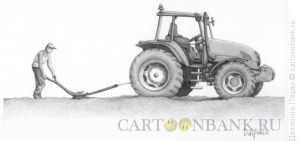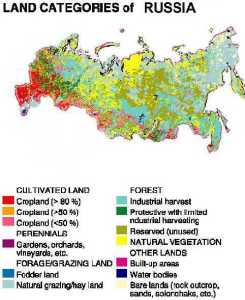 In 2010 a “temporary” Russian President, Dmitry Medvedev, signed a Decree “On Approval of Food Security Doctrine of the Russian Federation”. The doctrine stated: “Strategic goal of food security is to supply the country’s population with safe farm products, fish and other aquatic bioresources (hereinafter – fish products), and food.” The doctrine follows a Soviet-era tradition and contains a lot of inspirational words about the availability of food and its safety for the citizens of the country. How do precepts given by the head of the state five years ago externalize themselves in reality?
In 2010 a “temporary” Russian President, Dmitry Medvedev, signed a Decree “On Approval of Food Security Doctrine of the Russian Federation”. The doctrine stated: “Strategic goal of food security is to supply the country’s population with safe farm products, fish and other aquatic bioresources (hereinafter – fish products), and food.” The doctrine follows a Soviet-era tradition and contains a lot of inspirational words about the availability of food and its safety for the citizens of the country. How do precepts given by the head of the state five years ago externalize themselves in reality?
Experts point out that the Russian agricultural industry is experiencing four major challenges – climate, financing, shortage of technology, and qualified staff. It is possible that the climate problem can be resolved by global warming or by the annexation of the territories of neighboring countries, such as the fertile Ukraine. However, the other three problems of agriculture will not disappear if they are not addressed.
Among the “priority national projects” of the mid-2000s, which are almost forgotten today, was a national project called the “Development of the agro-industrial complex (AIC)”. It came down to the purchase and transfer of the machinery and equipment for livestock for leasing, as well as to subsidizing interest rates on loans for agricultural development and the creation of a system of land and mortgage lending. Since 2008, this “national project” has transformed into the National Program for Development of Agriculture. More than half of a trillion rubles were planned to be spent on the implementation of the program in 2012 and more than 2.12 trillion rubles from 2013 and through 2020. These estimates do not include the cost of the individual sub-programs – approximately 1.5 trillion rubles, as well as of the individually targeted programs, for which tens of billions of rubles from the state budget are planned to be spent. As we can see, no problems were expected to appear regarding the financing of agriculture at the expense of the federal budget. At least not until the federal budget suddenly began to dry up.
Russian agro-industry clearly lacks professional management. In 2000s, the people that are very far from the agriculture world were appointed to be ministers of the agriculture: Alexey Gordeyev – a career public servant, Elena Skrynnik – an economist, an expert on leasing, Nikolay Fyodorov – a lawyer. In April 2015, Alexander Tkachev, an ex-governor of the fertile Krasnodar Region, was chosen to take the post of the minister of agriculture. Tkachev is considered to be the largest landowner of the Krasnodar Region and the latest figures show that he can enter the list of the five largest landowners in whole Russia. Numerous scandals associated with Tkachev do not bother Kremlin: he made a lot of openly chauvinistic public statements; the state agencies were considered to have been merged with a gang of killers in the village of Kushchevskaya in Krasnodar Region; criminal negligence of the authorities of the region lead to the deaths of people during floods in Krymsk. These are only the most high-profile stories of fifteen years of Tkachev’s governorate of Krasnodar Region. However, Kremlin’s guidelines for the appointments to the high office are “the worse – the better”. We can assume that while in his new position Tkachev will try to seize all of the country’s agriculture.
Russia has a tenth of the world’s arable land, a quarter of fresh water, more than 8% of the reserves of raw materials for production of mineral fertilizers. During Soviet times, the population of the country was two times higher than the population of  Russia today, and almost a half the amount of food was imported from overseas. According to RBC, in the decade from 2000 to 2010, the rate of increase in the volume of imported food significantly exceeded the growth of domestic production. Despite the high-profile national projects, farmers can not get cheap and extended bank loans, the agriculture sector lacks modern refining capacity, productivity remains very low. Today it is impossible to find agrarian graduate in Russia who has knowledge and skills needed in the modern agriculture. The situation is becoming ridiculous: the instructors of the Agricultural Academy have never seen modern milking equipment; students practice to drive tractors made in 1930’s; specialized universities’ logistical base has not been updated since the 1980’s. The program for 2013-2020 mentioned above talks about promoting innovation and innovative development of agriculture, however it does not have any reference to the higher education system.
Russia today, and almost a half the amount of food was imported from overseas. According to RBC, in the decade from 2000 to 2010, the rate of increase in the volume of imported food significantly exceeded the growth of domestic production. Despite the high-profile national projects, farmers can not get cheap and extended bank loans, the agriculture sector lacks modern refining capacity, productivity remains very low. Today it is impossible to find agrarian graduate in Russia who has knowledge and skills needed in the modern agriculture. The situation is becoming ridiculous: the instructors of the Agricultural Academy have never seen modern milking equipment; students practice to drive tractors made in 1930’s; specialized universities’ logistical base has not been updated since the 1980’s. The program for 2013-2020 mentioned above talks about promoting innovation and innovative development of agriculture, however it does not have any reference to the higher education system.
With the introduction of an embargo on the supply of food from Western countries, Russian authorities are pinning their hopes on import substitution, that is a significant quantitative and qualitative growth of domestic agricultural production. Recently the head of the presidential administration, Sergei Ivanov, said that the sanctions regime is benefiting the country. “Our agro-industrial complex got a gulp of oxygen, and it believes now that the authorities give real opportunities for the development”, – he said. Beautiful words, however they will not fill a bushel. Even a partial failure on food imports should force the Kremlin to worry about what to feed the people. It is not clear who will work on “Tkachev’s lands”, with which technology and by what means.





